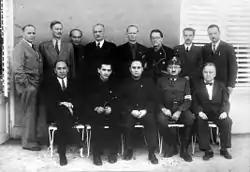Károly Beregfy
Károly Beregfy (12 February 1888 – 12 March 1946) was a Hungarian military officer and politician, who served as Minister of Defence in the 1944–45 Arrow Cross Party government.
Károly Beregfy | |
|---|---|
 | |
| Birth name | Károly Berger |
| Born | 12 February 1888 Cservenka, Bács-Bodrog County, Kingdom of Hungary, Austria-Hungary now Crvenka, Vojvodina, Serbia |
| Died | 12 March 1946 (aged 58) Budapest, Republic of Hungary |
| Allegiance | |
| Years of service | 1912–1945 |
| Rank | Vezérezredes (Colonel General) |
| Commands held | Hungarian Third Army, Hungarian First Army |
| Battles/wars | World War I World War II |
He was born as Károly Berger in Cservenka (Crvenka). He fought in the First World War where he was seriously injured. Then he joined the Hungarian Red Army to fight against the rebel nationalities. Between 1939 and 1941, he was commandant of the Royal Military Academy.

He fought in the Second World War from 1941 as commander of the VI Corps, and later commanded the Third Army and the First Army. In April 1944 he suffered a serious defeat by the Red Army. The commission examining the reasons of the defeat established Beregfy's personal responsibility, so he was dismissed from his field command.
He sympathized with the Arrow Cross Party from the beginning, although he could not join since under Hungarian Army regulations the members of political parties could not be officers in the Hungarian Army. After Operation Margarethe Arrow Cross leader Ferenc Szálasi sought him out and asked him to assist in a coup if Miklós Horthy tried to negotiate a surrender.
After the Arrow Cross Party's coup (15 and 16 October 1944) the new Prime Minister Szálasi appointed Beregfy as Minister of Defence. He also served as Chief of Army Staff. Beregfy declared Hungary a manoeuvre area on 30 October and subordinated all attainable human and economical resources to the war.
On 30 April 1945 he was captured by United States Army troops. Brought to trial before the People's Tribunal he denied his guilt throughout. The court did not accept his arguments (Beregfy referred to disability and compulsion) and sentenced him to death. He was hanged on 12 March 1946, along with Ferenc Szálasi, Gábor Vajna, former interior minister in the Arrow Cross Party's cabinet and József Gera, who was a Hungarist ideologist.
Sources
- Magyar Életrajzi Lexikon
- Géza Lakatos: As I saw it: the tragedy of Hungary. Englewood, New Jersey: Universe Publishing, 1993.
.svg.png.webp)